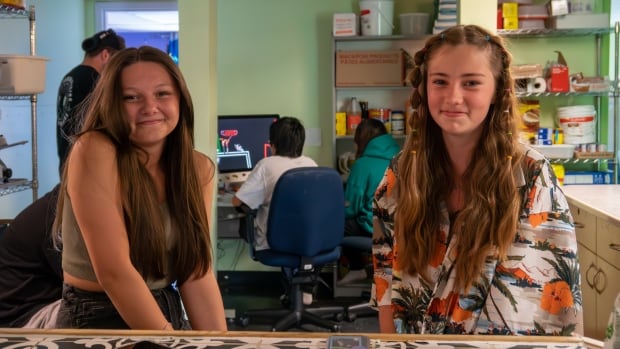
For these young people, this house in Thunder Bay is a safe haven — but they almost lost it
CBC
The house at the corner of Heron and McKenzie Street in Thunder Bay, Ont., is a place where young people like Brooke Walker and Miya Yerxa can eat, hang out and be themselves.
But the safe haven for children in the neighbourhood nearly shut its doors this spring due to funding issues.
Evergreen a United Neighbourhood is a grassroots organization that supports children and families in the Simpson-Ogden community. It primarily functions as a drop-in centre, but recently shifted its focus to fighting food insecurity. The organization has been running for over 15 years and next month marks 10 years since it's operated from the house.
Brooke, 14, and Miya, 15, come to the space to eat, chat and relax in the cozy room upstairs, which has bean bag chairs, string lights and a projector to watch movies.
"You don't feel judged when you're around people [here]," said Brooke. "If [kids are] having trouble at home, they can just come here and not have to worry about anything."
"[It is] a place to get away from school and stuff and just to hang out," added Miya.
A lot of children haven't had breakfast or lunch before coming to the house, so "they're really, really hungry," said Linda Bruins, Evergreen's executive director.
The neighbourhood grandmothers make sandwiches every week. Many older people who came to Evergreen as children return to help out. During the school year, volunteers may prepare up to 50 hot meals a day.
This spring, the organization appealed to city council for emergency funding so it could stay open. It has no core funding, which means it relies entirely on grants, donations and fundraisers.
"We were desperately running short. I actually laid myself off for four months … which was extreme," Bruins said.
Council voted to provide $10,000 to Evergreen in addition to its operating grant allocation of $30,000. The organization's entire operating budget this year was $123,400.
"Every year it gets a little bit more challenging to do this," said Bruins. "We're back in the clear again, which is another sigh of relief."
Bruins was raised in the neighbourhood and still lives there. She tries to teach children street smarts and how to stay safe.
"It's not an easy one to grow up in, but if you do, you'll be a survivor," she said. "[We've] got the poverty, we do have an extreme addictions problem in this neighbourhood."













